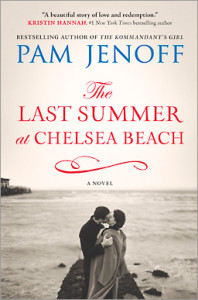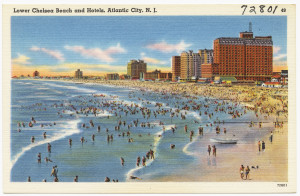 The choices we make in love and war (Atlantic City, Philadelphia, Washington, DC, England, France; 1941-1944): The title and cover of The Last Summer at Chelsea Beach suggest a light, beachy read. But if you’re familiar with Pam Jenoff, bestselling author of Holocaust-themed novels, a former State Department Foreign Service Officer who specialized in Holocaust issues, you expect more. More is what you get.
The choices we make in love and war (Atlantic City, Philadelphia, Washington, DC, England, France; 1941-1944): The title and cover of The Last Summer at Chelsea Beach suggest a light, beachy read. But if you’re familiar with Pam Jenoff, bestselling author of Holocaust-themed novels, a former State Department Foreign Service Officer who specialized in Holocaust issues, you expect more. More is what you get.
Grand hotels lined the beaches of Atlantic City, New Jersey in its heyday in the 1940s. Leading up to and during WWII, “Camp Boardwalk” – the nation’s first seaside boardwalk – also symbolized America’s home front: recruiting and training soldiers (later converting hotels into recuperative centers). So, this beach setting befits the summer release of Jenoff’s newest, multi-themed WWII historical novel – her first emotionally centered on mostly American soil.
Told through the sweetly sad voice of a teenage immigrant girl, Adelia Monteforte, over three transformative years as she navigates her identity, family, love, and aspirations. The emotional complexities of her coming-of-age story move through multiple locales, but Chelsea Beach is where it all begins and tugs at her heart.
Imagine being sixteen years old, pushed onto a ship from your childhood home in Trieste, Italy by your politically active parents trying to save you from Fascism. That’s how we meet Addie, a “gawky girl” petrified of the seas she’s lived by. For most of the novel, her parents’ whereabouts are unknown. She’s been shipped to her Aunt Bess and her Uncle Meyer’s home, located in a self-segregated Jewish neighborhood in south Philly, one of a “messy patchwork of ethnic neighborhoods.” Bless their hearts but the childless relatives are outsiders to parenting the way Addie is an outsider in America. Understandably, her voice, braver than she thinks, is melancholy.
Like so many families, they summered on the Jersey shore, where neighbors mingled, not defined by ethnicity or social class. This explains where, when, how, and why Addie can so easily become wrapped up in the fabric of an Irish Catholic family of four boys, the Connallys, when Jews and Catholics kept to themselves back in Philadelphia (and elsewhere).
Addie grows to depend on the Connally family, in spite of her independent spirit. Mrs. Connally treats her like the daughter she never had. The boys treat her like brothers, except maybe there’s more going on than that. This is, after all, a love story – or love stories – as much as a war story.
The novel starts off looking back in time. We’re told the Connallys “lived in a place where their grief would always be as raw as the day it all happened,” so early on the reader knows something momentous occurred at Chelsea Beach. Which is why Addie’s deeply rooted memories of this summer place are both happy and pained. They haunt her – grief, guilt, survivorship, and forgiveness are among the novel’s powerful themes.
Each of the Connally boys plays a role. The two older boys are Charly and Liam; the two younger are twins, Robby and Jack. The golden boy whose “smile lifted the world” is Charly, protective, bold, destined to do something heroic. Liam, with his “taunting grin,” has the darker side. He, like Addie, feels different.
Addie is the type who “finds the dark spaces between the light, even in the happiest moments.” She’s unsure of herself, unsure of her attractiveness yet romantically attracted to and entangled with more than one man. “We can’t always help who we love” is a repeated refrain, which increasingly takes on greater significance as Addie tries so hard to run away from her memories.
The first place she runs to after Chelsea Beach is Washington, DC, with its “bland, antiseptic feel,” where she finds work at the Washington Post. For reasons that constitute spoilers, suffice it to say that she runs away again, impetuously, desperate to go someplace “where no one knew me.”
This time she makes her way to London, after the Blitz but before America entered the war. What a foolish or brave thing for her to do, given why this Jewish girl was sent to America in the first place and events transpiring in Europe. There’s a vivid scene with a Polish citizen where she hears firsthand about the atrocities being committed against Polish Jews. The author was stationed in Krakow, enlarging the potency of the brief encounter.
Compared to America where the war felt “hidden,” in London war is visible everywhere: air raid attacks, bomb shelters, food rationing, and the “knackered” faces of ordinary, stoic citizens. Addie becomes especially emotionally affected seeing so many mothers without their children – Britain’s historic evacuation – reminding Addie of what her mother did for her. But since she’s also not the type to “look away from unfairness,” count on her to do something about this to make a difference.
My favorite romantic part of Addie’s story happens when she arrives at 19 Fleet Street, the London-based office of the Washington Post, where she’s managed to get herself transferred. Her keenness about issues and language skills land her a coveted job, outside the secretarial pool, alongside the “too good-looking” Teddy White, the only British journalist on the staff. His movie-star looks, “easy style,” and utter goodness make us wish he was based on a real historical figure but Jenoff tells us he’s not.
Teddy is immediately drawn to Addie. A former ladies man, with Addie he’s devoted, selfless, generous. For all these reasons and his upbeat attitude about winning the war now that America has entered into it, we immediately like him. His adoration for Addie wins us over with romantic lines like this: “My whole life I’ve felt as though I was writing the story. With you for the first time I feel a part of it.” If only Addie felt the same way! Yes, she appreciates him but remember she’s plagued by memories back at Chelsea Beach. You so wish she’d find a girlfriend to tell it to her like it is!
Jenoff wisely offers Addie – and us – one. Another character who feels so historically real, but apparently she’s made up too. Claire is Churchill’s niece, who lost her parents and was raised by another family (Churchill’s), echoing Addie’s history. Glamorous Claire can hobnob with the upper class, which she does, but she gravitates to Addie because she’s “real.” No-nonsense Claire is “fearless, intense and ready to fight,” which she does when she joins the Auxiliary Territorial Services, the women’s branch of Britain’s Army.
At this juncture, we behold how the pieces of Addie’s character formed from her life experiences and life choices in Atlantic City, Washington, DC, and London resonate with the war direction of her story. For circumstances do propel Addie on a dangerous mission in France.
From here, Addie’s story circles back as the reader knew it would from the opening. There are subtle clues to the ending, which bind the novel’s themes. Up until the very end, the question you’ll be asking is: Can Addie – Can We – ever really go home again?
Lorraine

A terrific review, Lorraine! This sounds like a layered, multi-faceted novel. I love this time period. Even more than that, I enjoy stories that attempt to answer the question you posed at the end. How we define home is an important consideration in how we view the world.
From a writer’s standpoint, I’m especially interested in how the author was able to create a melancholy character who “finds the dark spaces between the light, even in the happiest moments” without become unbearably brooding and turning readers off. I will have to read this novel with a writerly eye.
Great review!
Hi Jackie,
You raise a most interesting question. I’d edited out some words about how the reader is able to put themselves in Addie’s unsure young shoes … getting a little to your point. I think the answer is found in the sweetness of Addie’s voice, and in the character Jenoff has created: braver than she gives herself credit for, especially when viewed against the backdrop of the historical times. Also, the fictional characters of Teddy White and Claire, Churchill’s niece, are so likeable and so good to Addie that they are uplifting. Also have to keep in mind she’s only 16 – 19 in this story, so she’s trying to figure out a lot and deal with a lot. She accomplishes much in DC and London, so we admire her. Maybe the answer to your question is she feels real. I’ll await your thinking!
By the way, Jenoff’s debut, THE KOMMANDANT’S GIRL published in 2007 about the Polish Jewish Resistance Movement and the 2008 sequel, THE DIMPLOMAT’S WIFE are powerful reads. She’s also a law professor, so she’s an inspiration to writers!
Thanks for your thoughtful comments. Looking forward to your “writerly” analysis! Lorraine